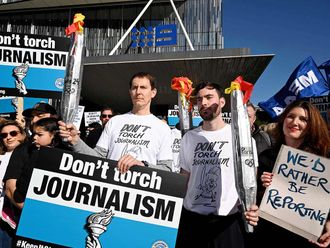London: The anti-immigration UK Independence Party (UKIP) broke through as a major political force on Saturday following local elections which delivered a bloody nose to Britain’s ruling coalition.
UKIP leader Nigel Farage said his eurosceptic party could no longer be dismissed as a protest movement as it averaged almost one quarter of the vote in local authority elections in England. “This is a real sea-change in British politics,” Farage said.
Prime Minister David Cameron’s Conservatives appeared hardest hit by UKIP’s surge, and he acknowledged the success of the party he once dismissed as full of “fruitcakes, loonies and closet racists”.
“We need to show respect for people who have taken the choice to support this party and we are going to work really hard to win them back,” Cameron said.
The BBC put the projected national vote share for UKIP at 23 per cent, as it secured more than 130 council seats in Thursday’s voting.
The Conservatives came only just ahead of UKIP with a projected 25 per cent share of the national vote, after losing more than 300 seats and ceding control of 10 councils, although they still controlled 18.
The opposition Labour party, which has been leading opinion polls amid a government austerity drive and stagnating economy, led the field with 29 per cent, and won modest gains of around 290 seats.
The Conservatives’ junior coalition partners, the Liberal Democrats, were pushed by UKIP into fourth place with 14 per cent.
Major breakthrough
UKIP still does not have a single member of parliament and will struggle to translate its local election success into victory at the 2015 general election.
But the results are a major breakthrough and bode well for its prospects in European Parliament elections next year.
“We have been abused by everybody, the entire establishment, and now they are shocked and stunned that we are getting over 25 per cent of the vote everywhere we stand across the country,” said Farage, a charismatic MEP.
The 49-year-old’s beaming face was splashed across Saturday’s front pages.
“UKIP on the march,” the Guardian pronounced, while the Times’ headline read: “Cameron chokes on his words after Farage’s feast.”
The coalition parties had braced for losses in the mid-term elections, which are often used by voters to punish ruling parties.
But the results were sobering for the government, particularly in the parliamentary by-election in South Shields, northeast England, which took place at the same time.
Labour held the seat, vacated by former foreign minister David Miliband, although its majority was almost halved.
UKIP came second with 24 per cent of the vote, followed by the Conservatives in a poor third place and the Lib Dems in a humiliating seventh, with just 352 votes.
“I think there are major lessons for the major political parties,” Cameron said in his Oxfordshire constituency, where the Conservatives lost control of the local council.
Asked if he stood by his “fruitcakes” attack on UKIP, the prime minister said: “Well, look, it is no good insulting a political party that people have chosen to vote for.”
He said voters clearly wanted the government “to do even more to work for hard-working people to sort out the issues they care about”, citing the economy, immigration and welfare.
Privileged background
Senior Conservative David Davis warned that the privileged background of prominent figures in the party makes them seem remote to ordinary voters, and he urged Cameron to stop surrounding himself with people from his old boarding school.
“The fact is that if we want to win the next election, we have to break this impression of being privileged and out of touch,” Davis wrote in Friday’s Daily Telegraph.
Cameron was educated at the elite Eton boarding school and recently appointed an old schoolmate, Jo Johnson, as his head of policy. Unpopular finance minister George Osborne also attended an exclusive private school, while all three went to Oxford University.
UKIP, once driven by the sole aim of withdrawing Britain from the European Union (EU), has picked up support from socially conservative voters, many of them older people disillusioned by the mainstream parties, particularly with their failure to control immigration.
Cameron sought this week to claw back support by indicating that he may bring forward legislation on holding a referendum on Britain’s membership of the EU.
He had previously said the commitment to hold an in-out vote would not be put into law until after the 2015 election.
However, Rob Ford, an expert on UKIP at the University of Manchester, warned: “UKIP success is today being driven by domestic issues, especially immigration, not the EU. Offering a tougher line on Europe is not the solution.”










_resources1_16a30b3523c_small.jpg)

